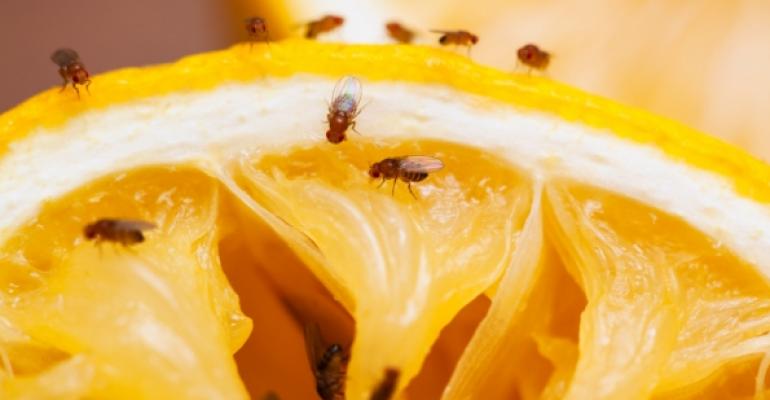Mouse droppings, a scurrying cockroach or a swarm of fruit flies are the last things a restaurant owner wants a health inspector to spot during a surprise inspection.
The good news for restaurant operators is that the same care they take to keep clean establishments, food properly stored and employees well-trained on food safety and maintenance, can help them avoid pest infestations.
Be vigilant, and don’t ignore the little things, such as the floor tile grout, doors that don’t close properly or that trash can by the entrance, said Hope Bowman an entomologist and technical specialist for Parsippany, NY-based Western Pest Services.
“Prevention is the best measure. You need to make sure your staff is educated,” she said. Bowman offered the following advice on ways to deal with the three most common pest problems for restaurants.
Mice
No one may ever see the rodents, but they typically leave behind droppings. The cause is usually an opening somewhere—doors left open or that won’t close properly, cracks in walls, or pipes not tightly sealed.
“Keep doors closed as much as possible and keep trash as far from exterior doors as you can,” Bowman said.
Cockroaches
A restaurant can be as tightly sealed as a drum but still be affected by cockroaches. One thing to always do is thoroughly inspect food deliveries.
“They almost always are brought in from deliveries,” she said.
Cockroaches can come from a restaurant’s neighbor or crawl through electrical lines, but their most common method for entry is via a delivery.
Flies
Flying insects are harder to combat in general. They are not staying in one place, and they are not just on the floor but also in the air. The same rules for rodents and roaches apply here as well – keep doors closed, and repair cracks and broken seals. Using fly lights with traps can help mitigate fly problems.
“And watch how you manage trash,” Bowman said. “Keep it away from the building and covered so there are fewer flies around the restaurant.”
The bar can also be challenging when it comes to flies. Sweet, syrupy drinks and spills while pouring drinks are a strong attraction for flies, especially fruit flies.
“They will go toward sweet fermented drinks and toward sweet dishes,” she said. “When you have a bar or seating outside, it’s hard. You do not have control of what is around your establishment.”
Operators should make sure bar areas are cleaned well at the end of the night. Mats also should be scrubbed, drains cleared, and any grout that is not in good shape should be repaired.
“After a long night, when you are leaving at 11 o’clock or midnight, it’s hard to want to clean up. You just want to go home,” Bowman said. “But from the time you close the restaurant to when you open – that’s several hours for a pest to be busy breeding and causing more problems in your restaurant.”
Best Prevention
Overall cleanliness of a restaurant is a strong deterrent. That includes keeping the floors clean, cleaning grease traps and grills and checking overlooked areas such as under refrigerators where food can get trapped and motor housings where food, dust and grease can hide.
When to call for pest control
“Operators should consult with a licensed pest control professional as part of their regular building maintenance – before there is a problem," Bowman said.
A pest control expert can point out potential problem areas and educate managers and staff on best cleaning practices. This also helps to establish a relationship with a pest control company in advance of any issues.
“If an operator does not have a regular pest control provider, it may take a few weeks to find one and take that much longer to address a problem,” she said. “The sooner a provider gets called, the sooner the problem can be resolved.”
Often restaurant operators will wait until they see mouse droppings or a cockroach before they call a pest professional, or worse, after a health inspector cites them for a pest infestation, Bowman said.
About those health inspections…
There are two ways to handle surprise inspections, said Bowman who has helped trained health inspectors. The wrong way is to get defensive and argumentative with an inspector. The right way is to be cooperative.
“Those who handle it well are quick to solve a problem while the inspector is there,” she said. “Anything an inspector finds – they fix it on the spot. The health inspector will see that and usually give an operator the benefit of the doubt. If you are willing to fix things quickly, it goes a long way.”




